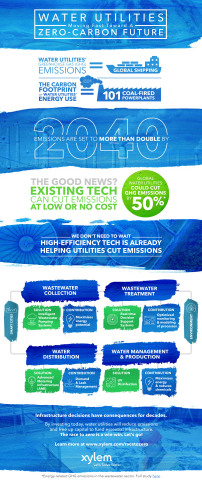Global Water Utilities Could Cut GHG Emissions by 50%, At Low to No Cost
New Paper Outlines Steps to Accelerate Sector’s Progress Toward Zero-Carbon Future
This press release features multimedia. View the full release here: https://www.businesswire.com/news/home/20211104005835/en/

Global water utilities could cut GHG emissions by 50%, at low to no cost. (Photo: Business Wire)
‘
“Water operators have long been stewards of such an essential resource. Water infrastructure is a cornerstone of every community and local economy around the world,” said
“Readily available technologies are an important and affordable part of the roadmap in utilities’ ‘race to zero,’” continued Decker. “Combined with changes in process, policy and practice, these solutions can get utilities well on their way to net-zero emissions.”
Xylem’s initial study of wastewater infrastructure, Powering the Wastewater Renaissance, found that 50% of electricity-related emissions from the wastewater sector can be abated with existing technologies, such as intelligent wastewater pumping systems, adaptive mixers with variable speed drives, and real-time decision support systems. ~95% of this impact is achievable at zero or negative cost1. Likewise, in clean water, further analysis by
In the
The paper emphasizes that deploying available high-efficiency technologies is one of several key steps leading utilities are taking as part of their wider strategies to reduce emissions:
1. Make firm commitments to reduce emissions by joining the water sector’s Race to Zero. Led by the UN’s High-Level Climate Champions for Climate Action, the Race to Zero is a global initiative, rallying companies, cities, and regions to take immediate action to halve global emissions by 2030 and deliver a healthier, fairer zero carbon world in time.
2. Deploy affordable, high-efficiency technologies to make meaningful, early progress. For example, intelligent wastewater pumping systems can cut energy use by up to 70% in wastewater pumping by reducing inefficiencies and emergency call-outs associated with clogging. On the clean water side, leak detection technologies can eliminate real water losses, saving energy consumed in the treatment and transport or water.
3. Define the supporting processes, policies and practices to get all the way to net zero. Water UK’s Net Zero 2030 Routemap details the broad range of approaches that are required to deliver on this commitment and provides specific actions to create accountability, reduce the costs and risks of the transition to net zero, and to unlock new benefits.
“There’s an opportunity for our sector to make a huge difference, starting now,” continued Decker. “The foundations of success are available, today: affordable technology, experience, funding, collaboration and, increasingly, regulatory incentives. Water utilities can win the race to zero while delivering the essential services on which their communities’ health and prosperity depend.”
About
1
2 Water
View source version on businesswire.com: https://www.businesswire.com/news/home/20211104005835/en/
Media
Houston Spencer
+1 (914) 240-3046
Houston.Spencer@xyleminc.com
Source: